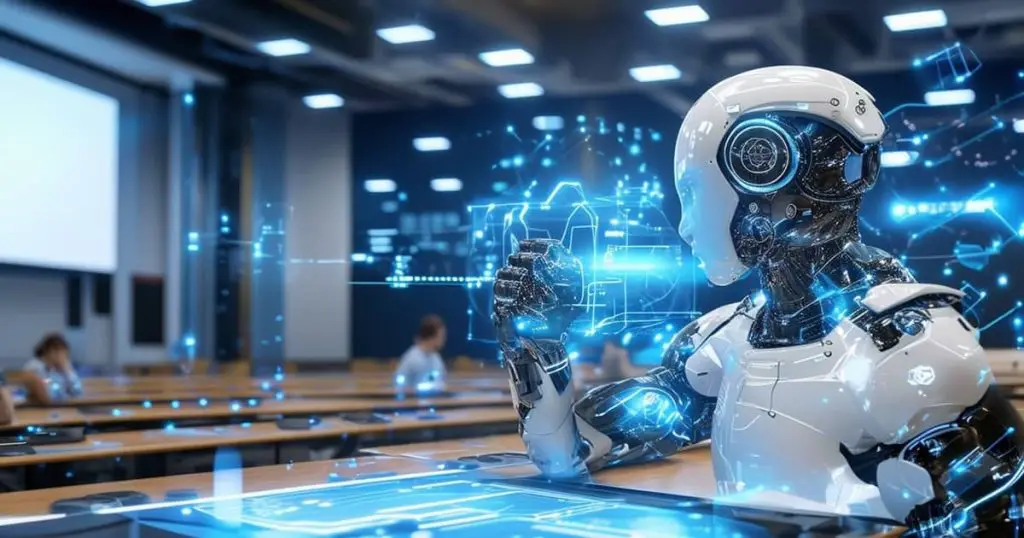
Table of Contents
Introduction
The landscape of education is rapidly growing, paving the way for “schools for the future” that embrace technological advancements to enhance learning experiences. As middle-aged adults, many of us are witnessing these changes firsthand, whether through our children’s education or our own continuous learning journeys.
Understanding the impacts of AI on education is crucial in preparing ourselves and the next generation for an increasingly digital world. AI, a powerful technology capable of learning and adapting, is revolutionizing modern education by personalizing learning experiences, automating administrative tasks, and providing valuable insights for educators.
As professionals, we can appreciate the efficiency and effectiveness that AI brings to educational institutions, allowing teachers to focus more on individual student needs and innovative teaching methods in the schools for the future. By inquiring into the realm of AI impacts on education, we can explore how this technology is reshaping traditional teaching methods, curriculum development, and administrative processes.
Embracing AI in education not only equips students with essential skills for the future workforce but also empowers educators to deliver high-quality, tailored learning experiences.
Let’s look deeper into the transformative power of AI in education and its implications for the future of learning.
The Role of AI in Modern Education
Incorporating AI into educational systems offers a myriad of benefits, such as enhancing teaching efficiency, improving student engagement, and fostering a more personalized approach to learning. As professionals, we can appreciate how AI streamlines administrative processes, allowing educators to focus on what truly matters — nurturing students’ growth and development.
Current applications of AI in education range from adaptive learning platforms that cater to individual student needs to tools that facilitate real-time feedback and assessment. By leveraging AI, educational institutions can create dynamic and interactive learning environments that cater to diverse learning styles and abilities.
Embracing AI in education not only prepares students for the future workforce but also equips them with the critical thinking and problem-solving skills necessary to thrive in an AI-driven world.
How AI Revolutizes Education
1. AI Transforms Teaching Methods
Transforming teaching methods involves a shift towards personalized learning experiences through AI technologies. Middle-aged adults, as professionals seeking career advancement, can benefit from understanding how AI is reshaping teaching practices.
By incorporating AI-driven adaptive learning platforms, educators can cater to individual student needs, ensuring a more tailored approach to education. This not only enhances student engagement, but also allows teachers to focus on fostering meaningful interactions with their students.
AI productivity tools play a crucial role in streamlining administrative tasks, freeing up educators’ time to concentrate on delivering high-quality education. As professionals balancing work and personal life, the efficiency brought by AI in teaching methods can alleviate some of the burdens faced in the educational field.
Embracing AI in teaching not only enhances the learning experience for students but also empowers teachers to create more dynamic and engaging lessons that cater to the diverse needs of learners. By leveraging AI technologies, educators can revolutionize traditional teaching methods and adapt to the demands of a rapidly developing educational landscape.
2. Shapes Curriculum Development
AI in Curriculum Development plays a pivotal role in shaping the educational landscape for middle-aged adults seeking continuous learning opportunities. By harnessing data-driven insights, educators can tailor curriculums to address specific skill gaps and prepare for future industry needs, aligning with professionals’ aspirations for career growth. This personalized approach, driven by AI technologies, ensures that educational programs remain relevant and impactful in a rapidly expanding job market.
Furthermore, AI’s ability to analyze vast amounts of data enables the identification of emerging trends and areas for curriculum improvement. Middle-aged adults, who are keen on staying competitive in their careers, can benefit from curriculums that are continuously updated based on real-time insights provided by AI systems.
Case studies showcasing successful integration of AI in curriculum development serve as inspiring examples of how technology can enhance learning outcomes and prepare individuals for the demands of the future workforce. Incorporating AI in curriculum development not only enhances the quality of education but also equips professionals with the skills and knowledge needed to thrive in a dynamic and AI-driven world.
By embracing AI in education, middle-aged adults can stay ahead of the curve and remain competitive in their respective fields.
3. Enhances Administrative Efficiency
Enhancing administrative efficiency In the fast-paced world of education, professionals are constantly seeking ways to streamline administrative tasks and optimize resources. AI is revolutionizing school administration by providing innovative solutions that enhance efficiency and effectiveness.
By leveraging predictive analytics, schools can now anticipate student performance and implement targeted interventions to improve retention rates, ensuring that each student receives the support they need to succeed.
AI tools such as automated scheduling systems, virtual assistants, and data management platforms are becoming indispensable in modern school administration. These tools not only save time but also reduce human error, allowing administrators to focus on strategic decision-making and student-centric initiatives.
For middle-aged adults balancing work and family responsibilities, the ability to access real-time data and insights through AI-driven systems can significantly ease the administrative burden and create a more streamlined educational experience.
As professionals navigate the complexities of managing educational institutions, embracing AI in administrative processes is key to staying competitive and delivering high-quality services.
By incorporating AI tools tailored to school administration, middle-aged adults can enhance operational efficiency, improve student outcomes, and pave the way for a more effective and future-ready education system.
Addressing Challenges and Ethical Considerations
As we integrate AI into education, it’s crucial to address the potential drawbacks and ethical concerns that come hand in hand with this technological advancement. While AI offers immense benefits, such as personalized learning experiences and improved administrative efficiency, there are also challenges that need to be navigated carefully.
One of the major drawbacks of AI in education is the risk of perpetuating inequalities. Without proper oversight, AI systems may inadvertently reinforce biases or disadvantage certain groups of students.
Additionally, there are concerns about data privacy and security, especially when sensitive student information is involved.
Parents and professionals alike are understandably concerned about the implications of AI on their children’s education and privacy. Ethical considerations surrounding AI use in schools revolve around transparency, accountability, and fairness.
It’s essential to implement strategies that ensure AI algorithms are transparent, decisions are explainable, and biases are minimized. Middle-aged adults, being proactive in safeguarding their family’s well-being, would be interested in learning about these strategies and advocating for ethical AI deployment in educational settings.
By proactively addressing these challenges and ethical considerations, we can harness the full potential of AI in education while safeguarding the interests and rights of all students.
Preparing Students for an AI-Driven Future
In preparing students for an AI-driven future, it is imperative to recognize the significance of AI literacy. Equipping students with the knowledge and skills to understand and interact with artificial intelligence is crucial for their success in their professional life.
By integrating AI education into school curriculums, educators can ensure that students are not only familiar with AI concepts but also capable of leveraging AI technologies effectively.
Parents and professionals are keen on ensuring that their children are well-prepared for the future job markets influenced by AI. They understand the importance of fostering critical thinking, problem-solving, and adaptability skills in students to thrive in a technology-driven world.
By advocating for comprehensive AI education in schools, they aim to empower the next generation with the tools needed to succeed in an AI-dominated workforce.
By emphasizing the integration of AI education and preparing students for the challenges and opportunities presented by AI, we can cultivate a generation of individuals ready to embrace the future with confidence and competence. This proactive approach not only benefits students but also contributes to the overall advancement of society in the era of AI impacts in the schools for the future.
Conclusion
The transformative potential of AI in education is undeniable, with “schools for the future” being reshaped by AI impacts. As we go through this development, it is crucial for educators, policymakers, and parents to embrace AI integration in education.
By recognizing the value of AI literacy and the need to equip students with relevant skills, we can ensure that the next generation is well-prepared for the AI-driven job market. Embracing AI in schools not only empowers students but also contributes to societal advancement in the era of AI impacts.
To stay ahead in this rapidly changing educational environment, it is essential to stay informed and proactive about AI developments.
Let’s work together to create a future where AI in the schools for the future enhances learning experiences, equips students with essential skills, and prepares them for the challenges and opportunities of tomorrow.



